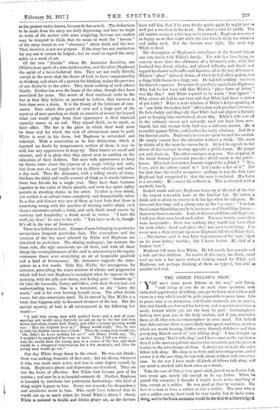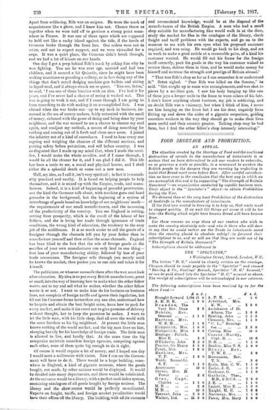THE OTHER FELLOW'S SHOP.
"you meet some queer fellows in the war," said Seton. " and living as you do at such close quarters, with unlimited opportunity of talking, you get to know men's ideas and views in a way which would bo quite impossible in peace time. Life in peace time is so strenuous, and leisure momenta are so scarce, that real friends are few and far between, and acquaintances wear a mask, behind which you are too busy to peer. Commonplace- looking men pass you in the daily routine, and if you remember them at all, they remain commonplace in your mind. Yet behind that dull exterior there is most likely some queer ambition, or ideas which are worth hearing, hidden away through diffidence and that paralysing British creed of not talking shop.' I was brought up on that saying 'Don't talk shop,' and I have come to the conclusion that it is the most stupid trite maxim over invented, and the greatest barrier to the interchange of ideas. I always try to make the other fellow talk shop. His shop is so fresh and interesting to me, and of course it is the one thing he can talk about without self-conscious- ness. In the war I have made all kinds of fellows talk shop, and my mind is stocked with fresh ideas as a result.
Take the case of Rife, a very queer stick, joined on as Junior Sub. two years ago, nearly old enough to bo my father. When he joined the company I thought I would never make anything of him, except as a soldier. He was good at that by instinct. Tie fact is a man is born a soldier or not a soldier. Tho man who it not a soldier can by hard work be very useful, but he lacks some thing, and in his frank momenta would bo the first to acknowladgo it Apart from soldiering, Rife was an enigma. He wore the mask of acquaintance like a glove, and I knew him not. Chance threw us together when we were told off to garrison a strong point some- where in France. It was one of those spots which are supposed to hold out like a rocky island against the tide, if the horde of Germans broke through the front line. Our orders were not to retire, and not to expect support, and we were victualled for a siege. It was a quiet place, the Germans didn't break through, and we had a lot of leisure on our hands.
One day I got a peep behind Rife's mask by asking him why he was fighting. You see he was over age, married and had two children, and it seemed a bit Quixotic, since he might have been making munitions or guarding a railway, or in fact doing any of the things that don't entail dodging machine-gun bullets and sitting in liquid mud, and it always struck me as queer. ' You see, Seton,' he said, ' I am one of those lunatics with an idea. I've had it for years, and I've never had a chance of seeing it worked out. This war is going to work it out, and if I come through I am going to have something to do with making it an accomplished fact. I was abroad when the war broke out—up to my neck in business, im- mersed in the sea of money-makers, fairly saturated with the smell of money, sickened with the game of doing and being done by your neighbour, and the war seemed to me a chance to cleanse my soul again, and readjust my outlook, a means of doing something for nothing and coming out of it fresh and clean once more. I joined the infantry out of a kind of cussedness. I used to hear every one arguing and weighing the chances of the different services, and putting safety before patriotism, and self before country. I was so disgusted that I made up my mind that, when I made the sacri- fice, I would make the whole sacrifice, and if I came through, I would be all the cleaner for it, and I am glad I did it. This life has been a tonic to me, a moral and physical bracer, and I shall either die a splendid death or come out a new man.
Well, my idea, as I call it, isn't very spiritual ; in fact it is remark- ably practical and earthy. It is based on helping people to help themselves, and it is mixed up with the Empire, trade, and manu- facture. Indeed, it is a kind of beginning of peaceful penetration, not the kind the Germans talk about, with machine guns and hand grenades in the background, but the beginning of a system of interchange of goods based on knowledge of our neighbours' needs— the requirements of our small manufacturers, and the increasing of the productivity of the country. You see England is rotting, rotting from prosperity, which is the result of the labour of her fathers, and she is losing her trade through ignorance of trade conditions, the wrong kind of education, the tendency to the easy job of the middleman. It is so much easier to sell the goods of a foreigner through the channels left you by your father than to manufacture yourself and then utilize the same channels. England has been blind to the fact that the sale of foreign goods at the sacrifice of your own manufactures can only lead to one thing— first loss of your manufacturing ability, followed by loss of your trade connexions. The foreigner sells through you merely until ho knows the market, then pushes you to one side and takes it for imself.
The politicians, or whoever succeeds them after the war. must look after education. My idea is to put every British manufacturer, great or small, into the way of blowing how to make what the other fellow wants, not to try and sell what he makes, whether the other fellow wants it or not. I want to make him do his business on business lines, not complain of foreign tariffs and ignore their regulation, but fill out his Customs forms better than any one else, understand how to bargain and obtain the best freight rates, learn how to pack for every market, and make it his creed not to give promises of delivery without thought, but to keep the promises he makes. I want to let the little man, with his little shop, deal all over the world with the same freedom as his big neighbour. At present the little man knows nothing of the world market, and the big man lives on him, charging heavily for his knowledge of foreign trade. The little man is allowed to live, and hardly that. At the same time the big companies maintain countless foreign agencies, competing against each other, none of them quite big enough to do it right.
Of course it would require a lot of money, and I hoped one day
I would meet a millionaire with vision. Now I can see the Govern- ment will have to do it. There would be a huge building, some- where in England, a kind of gigantic museum, where the goods bought, not made, by other nations would be displayed. It would be divided into many departments, and these would be subdivided. At the entrance would be a library, with a perfect card-index system, containing catalogues of all goods bought by foreign nations. The library and the show-roome would be perfectly co-ordinated. Experts on freight, tariffs, and foreign market peculiarities would have their offices off the library. The building, with all its contents and accumulated knowledge, would be at the disposal of the manufacturers of the British Empire. A man who had a small shop suitable for manufacturing files would walk in at the door, study the market for files in the catalogue of the library, -.check freight and tariff problems with the experts, and go on to the museum to see with his own, eyes what his proposed customer required, and was using. He would go back to his shop, and set to work to make a good article at a reasonable price, of a. kind his customer wanted. He would fill out his forms for the loiseign tariff correctly, pack his goods in the way his customer wished to receive them, deliver them in time, and he would make money for himself and increase the strength and prestige of Britain abroad.'
" That was Rife's shop so far as I can remember it or understand it." Seton sighed. " Poor Rife was killed -en the Somme," be said. "Got caught up in some wire entanglements, and was shot to pieces by a machine gun. I saw his body hanging np like one of those jays a keeper nails to the fence to warn others-of his 'fate.
I don't know anything about business, my job is soldiering, and no doubt Rife was a visionary, but when I think of him, I never see him hanging on the fence but I see his dear, ungainly forin- flitting up and down the aisles of a gigantic emporium, guiding countless workers in the way they should go to make their lives more useful and their country greater. Talking shop may be had form, but I find the other fellow's shop intensely interesting."







































 Previous page
Previous page